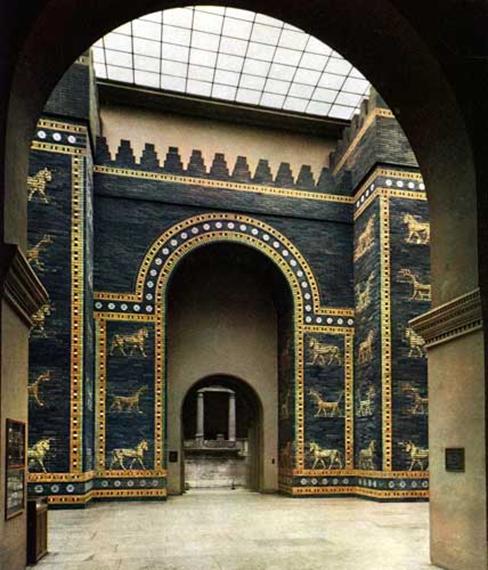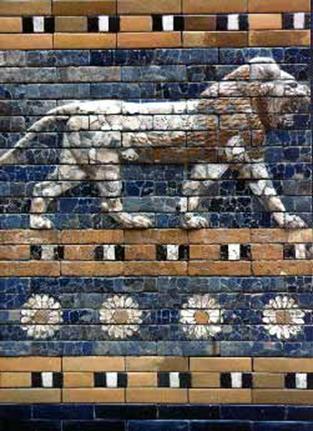18 April 2012
I was horrified to hear on the BBC World Service, during the night, that one of the most important archaeological sites in the world, Babylon, has been completely destroyed. Today apparently there is no sign at all of the main brick lined street and the Hanging Gardens. I only caught snippets of this as I was half asleep but I gather the destruction took place due to the Americans installing a large pipe running right through the site, leaving no sign of the famous city which I visited in 1962. Of course, I could have got it wrong or missed something. I certainly hope so. You will understand why I abhor such vandalism when you read below what I wrote in my autobiographical notes concerning my visit to Babylon, when I was living in Baghdad.
Babylon
Certainly the highlight of my time in Iraq was my visit to Babylon, the most famous ancient city in the world.. I was fortunate enough to be there when they had completely excavated the Main Street and exposed the bas relief of lions (and other animals?) on the then roughly 40 feet high walls.
It was the capital of ten Mesopotamian dynasties starting with the dynasty of King Hammurabi (1792-1750 BC); the 6th king of the 1st dynasty; reaching prominence as the capital city of the great kingdom of Babylonia. The last dynasty at which Babylon achieved its zenith, is well known particularly of its 2nd king, Nebuchadnezzar II (605-563 BC), to whom most of Babylon’s existing buildings belongs.

Babylon was renowned for its high, well-fortified walls and for the magnificence of its temples and palaces. Its famous Hanging Gardens, built by King Nebuchadnezzar II for his wife Amytas, were one of the Seven Wonders of the World. Amytas was a Medes and her home was in mountainous country, so the King reputedly had the Hanging Gardens built to allay her homesickness.
Nowadays, its ruins covers about 302 km lying on the east bank of Euphrates 90 km south of Baghdad and about 10 km north of Hilla. The most important of the standing monuments of Babylon today are the Summer and Winter Palaces of King Nebuchadnezzar II, the Ziggurat attached to it, the Street of Processions, the Lion of Babylon, and the famous Ishtar Gate.
In Akkadian times, around 2350 BC, Babylon was a small village, which in 5 or 6 centuries had grown in size and importance, mostly during the reign of the 3rd Dynasty, until it rose like a city meteor to deal the coup de grace to Sumerian authority in Mesopotamia under Amorite kings. Babylon itself became a major city-state, as the capital of the great Amorite soldier, the famous king, law-giver and social reformer King Hammurabi, with a code of common law, and a king with genuine concern for the well-being of his subjects – an unusual feature in those times
I walked down this Main Street, when Nebuchadnezzar had ridden in triumph, almost 3000 years earlier, entirely alone, there were no other tourists that at that time. What a privilege; what a sense of history one felt,



On this trip I saw, what I was told, was the evidence of the famous hanging Gardens of Babylon. It was explained to me that these gardens which were 20 or 30 feet above normal ground-level had been created with asphalt tanking to contain the water and thus they were able to grow plants and trees way above normal ground-level. Whether this is true or not I have never established but it certainly makes good sense to me.
Now you will know why I cannot believe that anyone would desecrate such an important archaeological site. If any of my readers know what is the current state of Babylon I would be very pleased to hear from them.
Yesterday we had two visitors for morning coffee, Liz Moon-the artist-and her friend Ken. Liz a very old friend of Alice’s, in fact, she was at school with her. Liz is also the artist painted a wonderful conversation piece for my 70th birthday.
Alice usually asks people for 11 o’clock knowing that my carers come at midday and therefore visitors will not be able to stay long enough to wear me out. However, in the middle of the coffee morning came two more visitors Sarah, and her colleague Richard, from Roho cushions. After Sarah had been kind enough to call once before to explain how the cushion worked we could still not get maximum comfort out of it , so I asked her if she could very kindly get her local representative, Richard, to call in and adjust it to maximum comfort. Sarah was only too happy to oblige but insisted that she came herself, as well as Richardwas fairly new, which presumably meant that he has not yet expert then adjusting the cushion to the right pressure. In any event, they arrived at around 11.30 so we shuffled off ‘the Moon’ and her friend to the breakfast room while Sarah did her bit in my study on the cushion.
The trouble was that it felt extremely comfortable at nine o’clock in the morning and as the day progresses into evening it becomes progressively more uncomfortable. After sitting on it again for the whole day after the Roho team had left, it was a little better towards the end of the evening but still not quite right.
On the home front the government appear to have won their 10 year battle to deport Abduu Qatada but even now it appears he wiill have one more appeal to the Court of Human Rights (heaven knows who’s been fittingly Bill for all these legal proceedings however I suspect it is the poor old taxpayer). This appeal will no doubt delay the deportation a little longer. It seems crazy that we cannot rid ourselves of such a dangerous terrorist in case his own country treat him badly on his return. However,, our foreign office appears to have extracted an undertaking from the Jordanian authorities that any evidence he has given ‘under torture’ will not be taken into account in any subsequent trial and this appears to have placated the dissenters.
Another issue which has been causing quite a stir is our government’s announcement that it will introduce legislation to include VAT on takeaway hot food. You can imagine this has coursed quite a stir and a lot of possible’ what ifs’. For some reason the quips about this proposed tax have centred on our famous Cornish pasty. (I think our Prime Minister was seen eating one recently) For example, what if, you are in the bakery when the pasties had just been removed from the oven. They would clearly be hot and therefore subject to 20% VAT. If they were then put in the window display and, say, another customer came in an hour later, they would be cold and therefore not subject to VAT. I think the government might have created a minefield for themselves.
I think this sort of muddle might well have suggested a Confucian saying. I couldn’t find that one that was absolutely appropriate, but click here for some other sage advice.